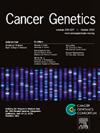28.在 CIViC 数据模型中添加非基因特征
IF 1.4
4区 医学
Q4 GENETICS & HEREDITY
引用次数: 0
摘要
CIViC(www.civicdb.org)是一个免费开放的知识库,它利用公众整理和专家审核来解决因需要解释来自肿瘤DNA下一代测序的大量变异而产生的瓶颈问题。从文献和会议摘要中收集的信息被用来创建证据项(EIDs),EIDs 的集合被归纳为断言(Assertions),这些断言反映了变异体领域的现状。断言包含变异体分类标准,如 AMP/ASCO/CAP 的临床可操作性标准,或 ClinGen/CGC/VICC 的致癌性指南。CIViC 数据模型不断发展,以更好地捕捉癌症的巨大变异。CIViC 采用灵活的基因变异模型,可将其组合成多基因分子轮廓。虽然基因突变在个性化医疗中发挥着最大作用,但肿瘤突变负荷(TMB)、微卫星不稳定性(MSI)或同源重组修复缺陷(HRD)等其他实体也越来越多地被用作诊断、预后或治疗标志物。为了捕捉这些实体,CIViC 引入了一种新的特征类型,它可以模拟与基因或基因组特定区域没有直接关联的肿瘤生物标记物。在 CIViC 数据模型中,这种新型生物标记物作为正式特征实体与基因(Genes)并存。与 "基因 "一样,每种生物标记物都将在 CIViC 中拥有一个页面,并尽可能与 NCI 词库条目相关联。CIViC 正在开发一种通用的特征-变体数据模型,以便在未来的更新中增加新的特征类型,如大型基因组区域。本文章由计算机程序翻译,如有差异,请以英文原文为准。
28. Addition of non-gene features to the CIViC data model
CIViC (www.civicdb.org) is a free and open knowledgebase that leverages public curation together with expert moderation to address the bottleneck created with the need to interpret large numbers of variants from next generation sequencing of tumor DNA. Curation from literature and meeting abstracts is utilized to create Evidence Items (EIDs), and collections of EIDs are summarized into Assertions which reflect the state of the field for a variant. Assertions incorporate variant classification standards such as those from AMP/ASCO/CAP for clinical actionability, or ClinGen/CGC/VICC guidelines for oncogenicity. The CIViC data model has consistently developed to better capture the considerable variation of cancer. CIViC employs a flexible model for gene variants which may be combined into multi-gene Molecular Profiles. While gene mutations play the largest role in personalized medicine, other entities such as tumor mutation burden (TMB), microsatellite instability (MSI) or homologous recombination repair deficiency (HRD) are increasingly used as diagnostic, prognostic or therapeutic markers. To capture entities such as these, CIViC has introduced a new feature type, which models tumorbiomarkers not directly associated with genes or specific regions of the genome. This new type of biomarker accompanies Genes as a formal Feature entity in the CIViC data model. Like Genes, each of these biomarkers will have a page in CIViC, and be associated with an NCI thesaurus entry whenever possible. CIViC is developing a generalized Feature-Variant data model, enabling the addition of new Feature types in future updates, such as large genomic regions.
求助全文
通过发布文献求助,成功后即可免费获取论文全文。
去求助
来源期刊

Cancer Genetics
ONCOLOGY-GENETICS & HEREDITY
CiteScore
3.20
自引率
5.30%
发文量
167
审稿时长
27 days
期刊介绍:
The aim of Cancer Genetics is to publish high quality scientific papers on the cellular, genetic and molecular aspects of cancer, including cancer predisposition and clinical diagnostic applications. Specific areas of interest include descriptions of new chromosomal, molecular or epigenetic alterations in benign and malignant diseases; novel laboratory approaches for identification and characterization of chromosomal rearrangements or genomic alterations in cancer cells; correlation of genetic changes with pathology and clinical presentation; and the molecular genetics of cancer predisposition. To reach a basic science and clinical multidisciplinary audience, we welcome original full-length articles, reviews, meeting summaries, brief reports, and letters to the editor.
 求助内容:
求助内容: 应助结果提醒方式:
应助结果提醒方式:


